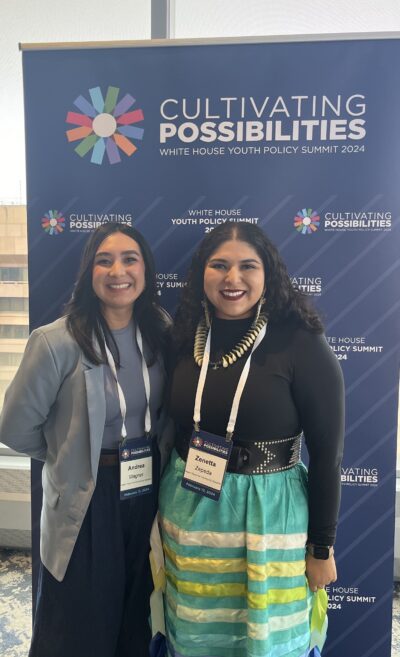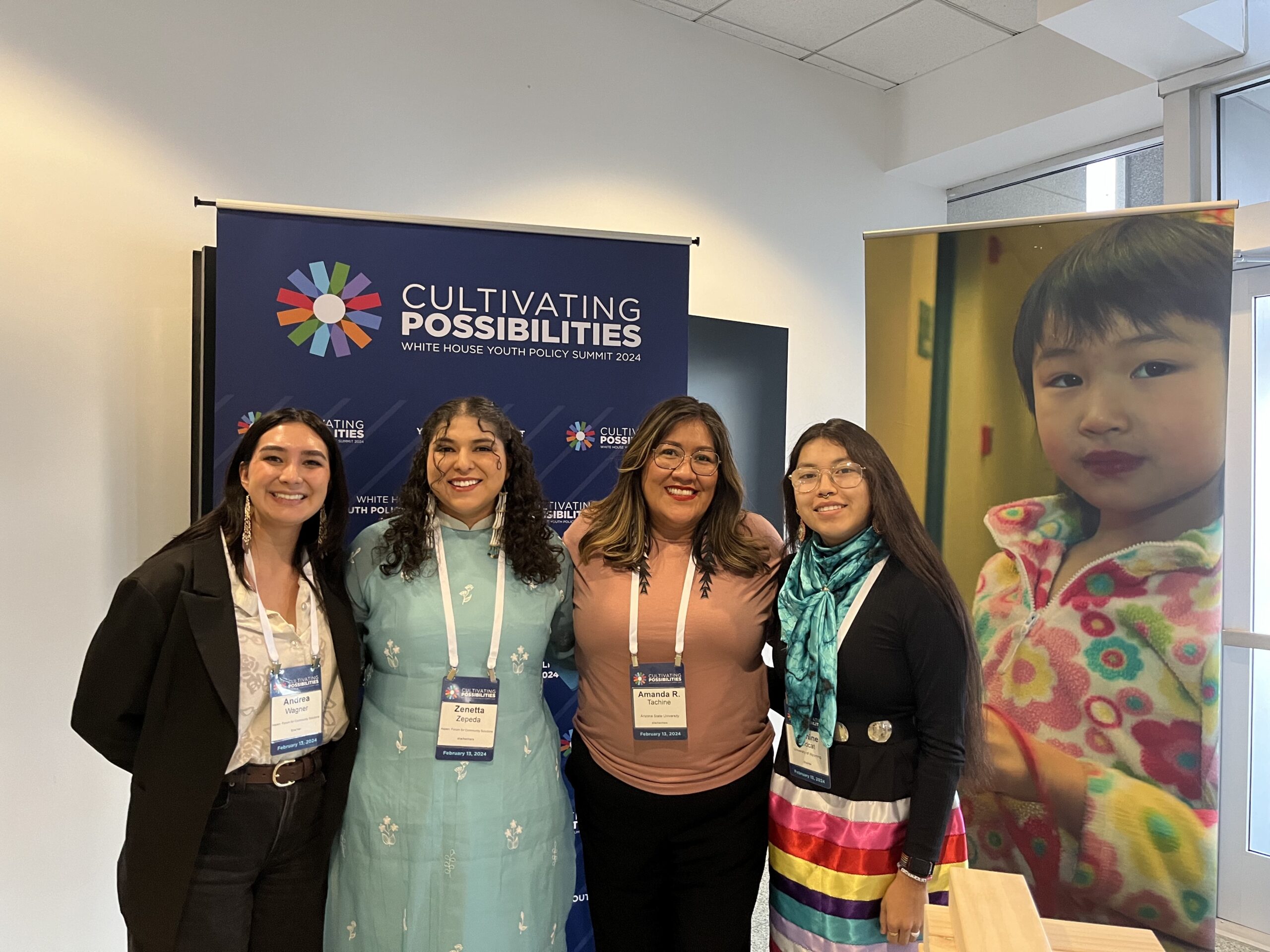
As we strive to make change and tackle the issues impacting young people, it’s crucial to ensure we have a seat at the table in decision-making processes at all levels. Whether it’s through community projects, programs, or shaping policies and laws, involving and centering youth and young adults is key to creating meaningful change. Youth are experts on their own lived experiences, and they are best positioned to report on the issues that affect them.
In alignment with this goal of centering youth voices, Zenetta Zepeda (Youth Leader/Researcher for the Youth and Young Adult Well-Being Project) and I (Senior Program Associate at Fresh Tracks and the Aspen Forum for Community Solutions) recently participated in the White House Youth Policy Summit.
At this summit, we collaborated with five federal agencies whose policies and programs deeply influence the lives of youth and young adults. The Biden-Harris Administration is seeking insights directly from youth and young adult leaders across the U.S regarding innovative solutions to help youth thrive. The summit was crafted in collaboration with youth and included young people representing different demographics, stages in life and ideas. Together, we represent the diverse youth and young adults of our country.
The summit centered around six pivotal themes: Well-Being, Belonging, Purpose, Identity and Meaning-making, Agency and Decision-making, and Leadership and Contribution. These themes tie in closely to the Fresh Tracks vision and to many of the areas of focus for the Aspen Forum for Community Solutions and its Center for Belonging, Meaning, Well-Being and Purpose. Fresh Tracks leaders show up as knowledge holders and experts in our programming, especially in the Youth and Young Adult Well-Being Project, in which young people and adult allies from diverse communities and organizations utilize a participatory action research process to develop innovative well-being and healing measures for our communities. We are defining, collecting, and making meaning of data about youth and young adult well-being, with a focus on incorporating lived experiences.
Because of its focus on aligned themes, the White House Youth Policy Summit created the opportunity not just to share the work we do, but also to influence federal policy and programming. When we talk about youth well-being, youth should always be in the room— nothing for youth without youth.
 Our goal was for our presence and contributions to affect tangible change that speaks to the needs and aspirations of our own youth communities, not just to serve as a rendezvous and photo opportunity with policymakers. We also hope that spaces like this summit serve as a place for us to connect with other youth and collaborate on cross-community action.
Our goal was for our presence and contributions to affect tangible change that speaks to the needs and aspirations of our own youth communities, not just to serve as a rendezvous and photo opportunity with policymakers. We also hope that spaces like this summit serve as a place for us to connect with other youth and collaborate on cross-community action.
We also understand that change requires everyone in the community to play a role. In the Well-Being Project, each research team is composed of youth researchers and adult allies who work with the youth towards the project’s goals. The Adult Allies have recently shared some of their key takeaways in Centering Youth in Well-Being Research and Programming: A Guide for Adult Allies.
We hope that you will join us by rallying behind youth leaders in your own community and continuing to provide them with support in shaping solutions for our future. Together, we are not just shaping policy; we are shaping OUR future.
I sat down and talked with Zenetta to hear her thoughts about the White House Youth Policy Summit and our work related to this space.
Question (Andrea Wagner): How can spaces like the White House Policy Youth Summit effectively harness the voices and knowledge of young people and create tangible changes for youth and our communities?
Answer (Zenetta Zepeda): Spaces such as the White House Youth Policy Summit offer the unique privilege of their platform, one that can be harnessed to address the core issues facing youth. Central to addressing these issues is the mantra repeatedly echoed: “Nothing for us without us.” With this platform and the convergence of numerous powerful youth, each a leading expert in their respective fields, we have the potential to affect the necessary change, provided we have the right tools at our disposal. Collaboration is essential, beginning with genuine partnerships and understanding. It’s crucial to recognize that collaboration should extend beyond merely listening to the needs for change and incorporating them into political discourse. Instead, it should serve as a catalyst for action.
Q: What makes you consider Centering Youth in Well-Being Research and Programming: A Guide for Adult Allies an important tool, and in what ways do you believe other organizations or agencies could benefit from its insights?
A: A Guide for Adult Allies represents a groundbreaking milestone for the well-being project.It emerges from authentic youth-centered efforts, cultivated by young individuals from diverse POC communities across the United States, in collaboration with adult leaders committed to Youth Participatory Action Research principles. Going beyond a focus solely on healing-centered engagement—a facet often overlooked in well-being research—it is enriched by the establishment of an intergenerational collective of researchers who intimately understand the identities of those they serve. This tool is designed for reciprocity; it has proven effective for us, and we urge other organizations to engage with it, sharing their insights and discoveries actively. With this guide, we aim to revolutionize youth-centered research, ensuring that it is not only informed by youth but also actively involves them in shaping its trajectory.
Q: What is something you want people to take away from this? Are there any messages you want to emphasize?
A: We require both youth researchers and those actively engaged in community-level efforts to inform and shape policy, ensuring the voices of young people are adequately represented. Currently, there exists a disparity between the impact we aim for and the action taken, yet I am confident that we possess the knowledge and community necessary to bridge this gap. For adults, it is crucial to stand as advocates for change and to remain grounded in the initial motivations that propel us youth into this work. And for us youth, recognize your leadership within your own spheres of knowledge and actively drive the change you wish to see.